When you’re eating three meals a day and possibly some snacks in between, your body needs an outlet for the components of food you don’t really need. Unfortunately, when the body is unable to release this waste with ease—in other words, you struggle to have a healthy bowel movement—you may feel bloated, backed up, and ultimately constipated. And as we all know, experiencing constipation is no fun for anyone. But what causes constipation, and what foods can we incorporate into our routines to provide relief and avoid a backup in the bathroom?
“Constipation can be due to a lack of fluid intake. Staying adequately hydrated is important for optimal digestion,” explains Sydney Greene, MS, RD, who specializes in chronic digestive issues. Some other factors Greene notes that can cause frequent constipation include a lack of physical activity as well as a highly processed, fat-rich diet.
One way to try and better regulate your digestion is to reassess what you’re eating each day. For instance, in addition to drinking more water to get more fluids, increasing your fiber intake can lead to more regular bowel movements, as fiber plays a major role in maintaining bowel health. This can lower your chances of becoming backed up and make it easier for your stool to pass through.
If you ever run into the issue of not being able to go to the bathroom for a long period of time but are unsure of which foods might help, try any of these 10 foods to relieve your constipation symptoms.
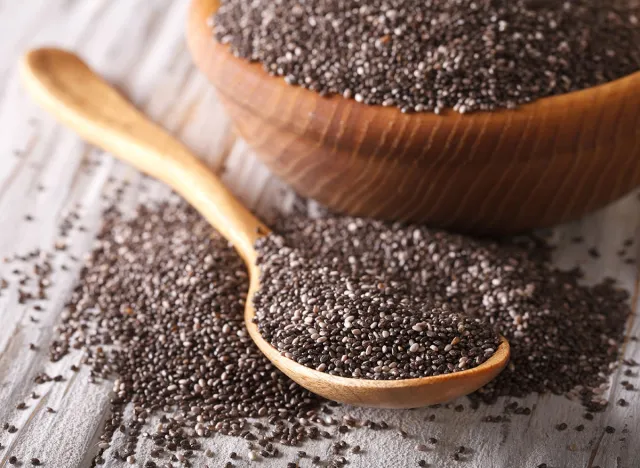

Whether you throw them in a smoothie or whip up a creamy cup of pudding, chia seeds can play a big part in helping your digestive system flow smoothly.
“These seeds swell to 10 times their size when in contact with fluids,” Greene says. However, it’s chia seeds’ gel-like consistency that “acts as a lubricant and helps ease bowel movements,” according to Greene. So when paired with a sensible amount of hydration, eating chia seeds can make a clear path for excessive food to leave your body safely.
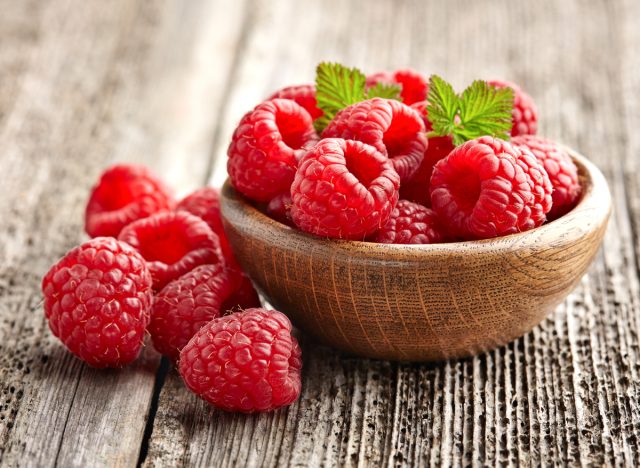

If you’re looking for a sweet, delicious, high-fiber food that can help with constipation issues, try a handful of raspberries.
“One cup of raspberries contains 8 grams of soluble fiber, which adds bulk to stool,” Greene says.
A report from Medical News Today even notes that raspberries have such significant fiber content, that they can potentially stop constipation in its tracks as well as contribute to a healthy and consistent digestive tract.
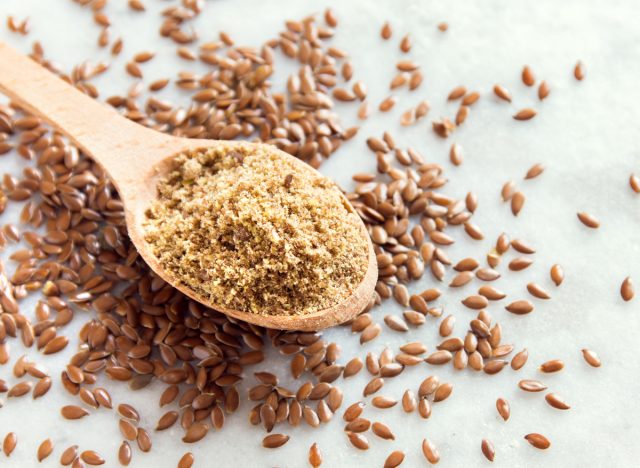

Ground flaxseeds are a great on-the-go snack. In a 2018 study from Nutrition & Metabolism, researchers saw some improvement in constipation symptoms in type 2 diabetes patients who ate flaxseed cookies twice a day, compared to patients who were given placebo cookies. The findings were attributed to the fact that flaxseeds may ease glucose levels—in other words, sugar in the bloodstream—and can simplify the body’s digestive process.
According to Greene, flaxseeds can be a great snack to relieve constipation symptoms because of how they bring “soluble fiber to the diet, which helps increase the transit time of bowel movements.”
READ RELATED: Woman, 26, has terrible reaction to steroid withdrawal
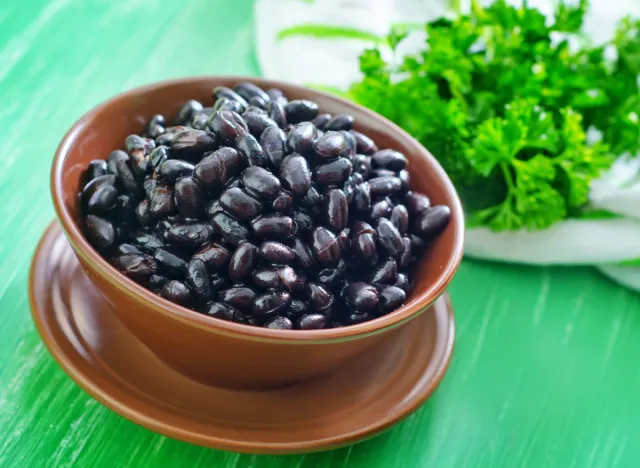

The next time you go to make a burrito or vegetable soup, make sure you add in some beans! Even if they come out of a can, the fiber they provide can support efficiency in your digestive tract.
“[Beans are] good sources of constipation-relieving fiber,” explains Lisa Moskovitz, RD, CDN, and the CEO of NY Nutrition Group. “Because [the fiber in beans is] non-digestible, it can help push waste through your intestines more quickly and efficiently,” Moskovitz says.
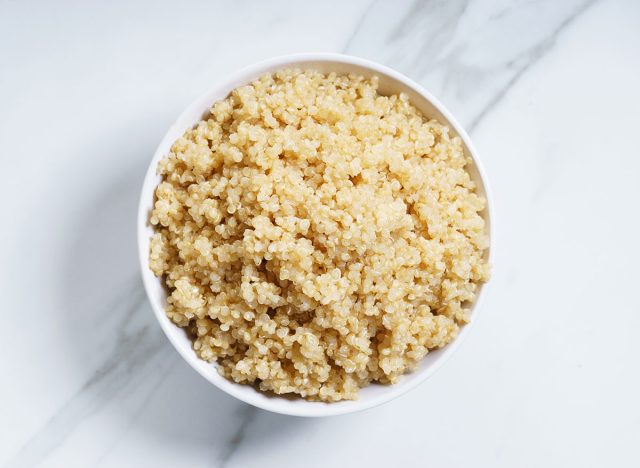

Next time you need to add a flavorful carb to your dinner plate, Moskovitz recommends quinoa. Not only does quinoa keep you full, but it can also help you prevent constipation symptoms. With over 11 grams of dietary fiber in one cup of quinoa, this superfood helps women and men meet daily dietary needs of 21–25 or 30–38 grams of fiber, respectively.
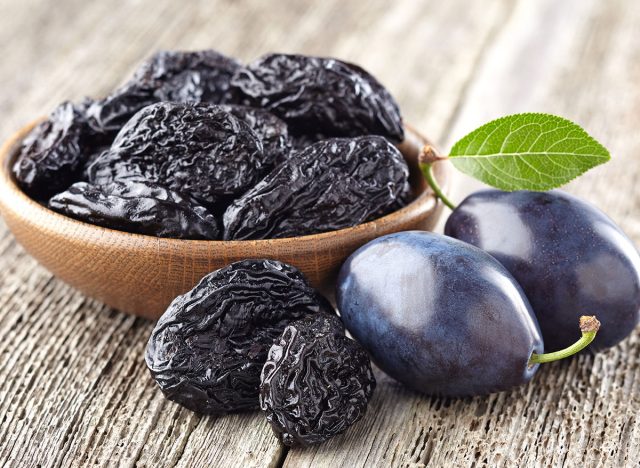

At some point in your life, you might have heard that drinking prune juice can help move things along in the bathroom. Well, there is a lot of truth to those rumors.
Studies have found that prunes can relieve constipation symptoms, improve stool output, and speed up the time of the final exit process in a healthy way. This isn’t too surprising, considering there are 12 grams of soluble fiber in a cup of prunes. Prunes are also considered a natural laxative due to the compound sorbitol.
“[Sorbitol] is a type of sugar alcohol naturally found in these plant foods that is poorly digested and attracts water into your intestines, making bowel movements easier,” says Moskovitz.
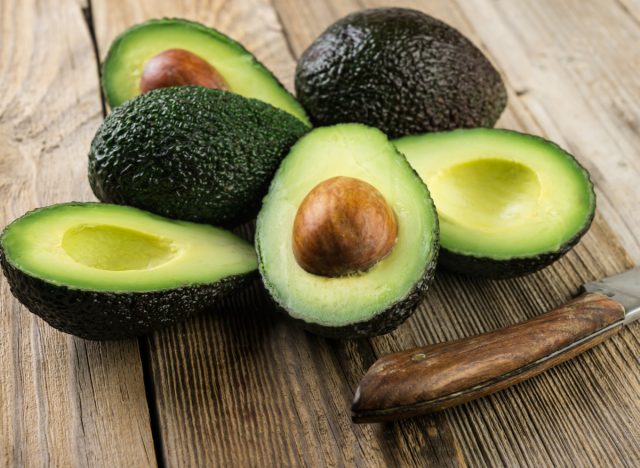

Avocado toast may do more for your mornings than supply your taste buds with a delicious breakfast. This fruit is one that hits all the bases, containing a considerable amount of fiber, magnesium, and sorbitol. Avocados also contain soluble and insoluble fiber, which can prevent constipation by supporting a faster digestive tract.
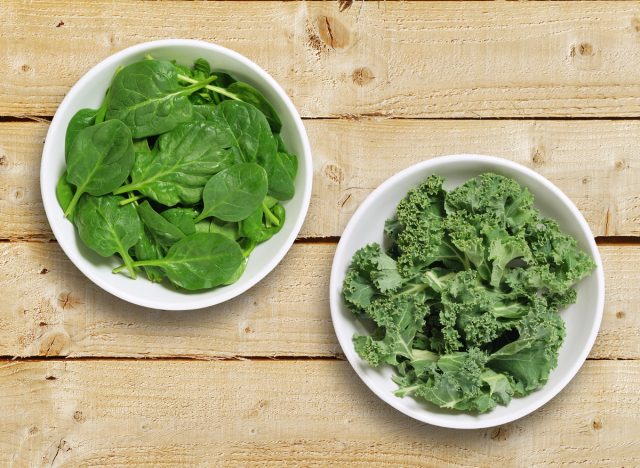

An easy way to introduce more fiber to your meals is by cooking up a hefty serving of leafy greens. In addition to fiber, leafy greens contain a significant amount of magnesium, which Greene identifies as “an important mineral that can help with constipation.”
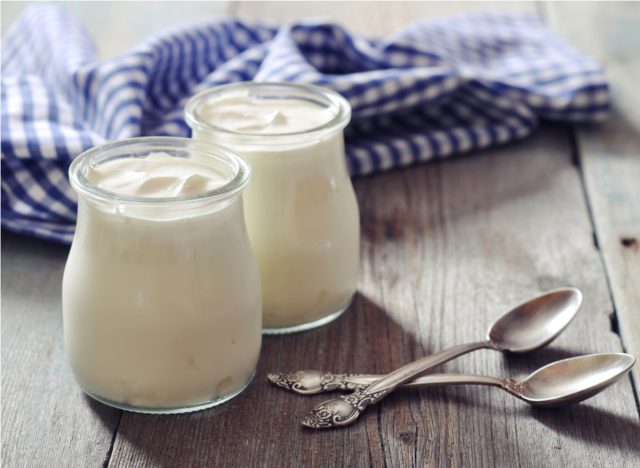

Both fiber and magnesium can support constipation relief, but there is one other source that may also be helpful—probiotics or live bacteria. Research suggests that probiotics can contribute to creating balance in the stomach, and the good bacteria within probiotics can help improve conditions in your digestive system, so it can effectively function and empty with more regular frequency. Some brands that carry yogurts with probiotics include Siggi’s, Stonyfield, and Chobani.
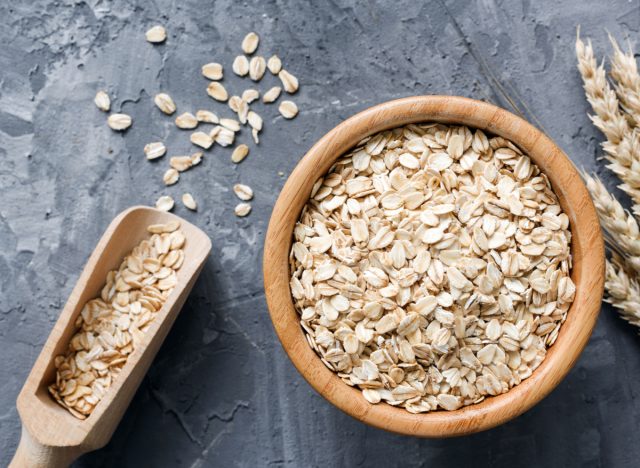

As far as whole grains go, oats are an “easy and healthy way to get more fiber in your diet,” according to Moskovitz. When you incorporate a good portion of oats into your diet, you may see less constipation and have more regular bowel movements. Therefore, try not to miss that morning bowl of oatmeal!
Source:









